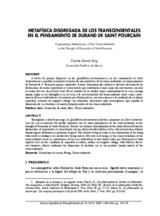Metafísica disgregada de los transcendentales en el pensamiento de Durand de Saint Pourçain
Fragmentary Metaphysics of the Transcendentals in the Thought of Durandus of Saint-Pourçain
Autor
Llamas Roig, Vicente
Editor
UCOPressFecha
2017Materia
Distinción de razónEnte
Transcendentales
Distinction of reason
Being
Transcendentals
METS:
Mostrar el registro METSPREMIS:
Mostrar el registro PREMISMetadatos
Mostrar el registro completo del ítemResumen
A través de pasajes dispersos en las Quodlibeta avenionensia y en los comentarios al Liber
Sententiarum es posible reconstruir el núcleo de una metafísica de los transcendentales en el pensamiento de Durand de S. Pourçain, apenas explorado. Bonum: denominación extrínseca del ente desviada de las distinciones de razón negotiantis et ratiocinantis que redefiniría el mal como disconvenientia, sin neta rescisión del acta de privatio boni. El ser relativo de la verdad como conformidad de la cosa consigo misma según su ser inteligido y su ser real, o la caracterización del transcendental unum como conveniencia del esse individuum a lo existente per illud quod est, con veto expreso a la condición de accidente separable, esbozan un original collage con elementos doctrinales muy heterogéneos que repudia la dimensión de res absoluta o la matriz formal positiva de los transcendentales. Throughout scattered passages in Quodlibeta Avenionensia and the comments on Liber Sententiarum
we can reconstruct the hardly explored core of some metaphysics of the transcendentals in the
thought of Durandus of Saint-Pourçain. Bonum: an extrinsic denomination of the entity diverted from the
distinctions of negotiantis et ratiocinantis reason, which would redefine evil as disconvenientia, without
dismissing its definition as privation of good. The relative being of truth as the relationship of the thing
with itself according to its intellective being and its effective real being, or the characterization of the
transcendental unum as convenience of the esse individuum to that which exists per illud quod est with
explicit veto on the condition of separable accident, outline an original collage, with diverse doctrinal
elements, which condemns the dimension of absolute res or the positive formal matrix of the
transcendentals.

